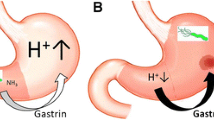Abstract
Colonic mucosa and adenocarcinoma are known to possess gastrin receptors. Recent studies have suggested that some patients with large intestinal cancers and polyps have elevated serum gastrin levels and that gastrin may stimulate growth of colonic neoplasms. The aim of the present investigation was to determine whether endogenous hypergastrinemia-induced by the proton pump inhibitor omeprazole-would influence growth in a subcutaneously implanted murine colonic cancer. The results show that despite a fivefold increase in serum gastrin levels (193 pg/ml median value, range 186–252, in the omeprazole-treated group vs 36 pg/ml median value, range 28–37 in controls), there were no differences in tumor size or survival of tumor-bearing animals. Additionally, there were no differences in serum gastrin values between tumor- (29 pg/ml, range 25–38) and non-tumor-(34 pg/ml, range 25–30) bearing, untreated animals. Endogenous elevation of the serum gastrin hormone to five times the normal level does not demonstrate trophic effects on the murine colon tumor MC-26.
Similar content being viewed by others
References
Bader JP, Walan A: Proceedings of the international symposium on omeprazole. Monte Carlo, Monaco, November 11–12, 1988. Scand J Gastroenterol 24(suppl 166):1–184, 1989
Singh P, Rae-Venter B, Townsend CM, Khalil T, Thompson JC: Gastrin receptors in normal and malignant gastrointestinal mucous: age associated changes. Am J Physiol 249:G761-G769, 1985
Upp JR Jr, Singh P, Townsend CM Jr, Thompson JC: Clinical significance of gastrin receptors in human colon cancers. Cancer Res 49:488–492, 1989
Smith JP, Wood JG, Solomon TE: Elevated gastrin levels in patients with colon cancer or adenomatous polypss. Dis Dis Sci 34:171–174, 1989
Sirinek KR, Levine BA, Moyer MP: Pentagastrin stimulatesin vitro growth of normal and malignant human colon epithelial cells. Am J Surg 149:35–39, 1985
Smith JP, Solomon TE: Effects of gastrin, proglumide, and somatostatin on growth of human colon cancer. Gastroenterology 95:1541–1548, 1988
Watson SA, Durrant LG, Morris DL: Gastrin dependence of human colorectal and gastric tumors. Gut 29:A738, 1988
Winsett OE, Townsend CM, Glass EJ, Thompson JC: Gastrin stimulates growth of colon cancer. Surgery 99:302–307, 1986
McGregor DB, Jones RD, Karlin DA, Rohmsdahl MM: Trophic effects of gastrin on colorectal neoplasms in the rat. Ann Surg 195:219–223, 1982
Singh P, Townsend CM Jr, Walker JP, Thompson JC: Gastrin receptors in a mouse colon cancer cell line response to trophic effects of gastrin. Surg Forum 35:205–206, 1984
Singh P, Walker JP, Townsend CM Jr, Thompson JC: Mouse colon cancer and trophic effects of pentagastrin in relation to gastrin receptor levelsin vivo. Dig Dis Sci 29:80S, 1984
Corbett TH, Griswold DP Jr, Roberts BJ, Peckham JC, Schabel FM Jr: Tumor induction relationships in development of transplantable cancers of the colon in mice for chemotherapy assays, with a note on carcinogen structure. Cancer Res 35:2434–2439, 1975
Mattsson H, Andersson K, Hakanson R, Larsson H, Sundler F, Wallmark B, Hassle AB: Sex and species differences in plasma gastrin and gastrin-dependent variables. Studies in rats and mice during omeprazole treatment. Gastroenterology 94:A291, 1988
Ryberg B, Mattsson H, Carlsson E: Effects of omeprazole and ranitidine on gastric acid secretion, blood gastrin levels and [3H]-thymidine incorporation in the oxyntic mucosa from dogs and rats. Digestion 39:91–99, 1988
Corbett TH, Griswold DP, Roberts BJ, Peckham JC, Schabel Jr FM: Evaluation of single agents and combinations of chemotherapeutic agents in mouse colon carcinomas. Cancer 40:2660–2680, 1977
Johnson LR: New aspects of the trophic action of gastrointestinal hormones. Gastroenterology 72:788–792, 1977
Johnson LR: The trophic action of gastrointestinal hormones. Gastroenterology 70:278–288, 1976
Watson SA, Durrant LG, Morris DL: Growth-promoting action of gastrin on human colonic and gastric tumour cells culturedin vitro. Br J Surg 75:342, 1988
Larsson H, Carlsson E, Junggren U, Olbe L, Sjstrand E, Sknberg I, Sundhild G: Inhibition of gastric acid secretion by omeprazole in the dog and rat. Gastroenterology 85:900–907, 1983
Brunner G, Creutzfeldt W, Harke U, Lamberts R: Therapy with omeprazole in patients with peptic ulcerations resistant to extended high-dose ranitidine treatment. Digestion 39:80–90, 1988
Silverberg E, Lubera JA: Cancer Statistics. Cancer 39:3–20, 1989
Allen JM, Bishop AE, Daly MJ, Larsson H, Carlsson E, Polak JM, Bloom SR: Effect of inhibitions of acid secretion on the regulatory peptides in the rat stomach. Gastroenterology 90:970–977, 1986
Ekman L, Hansson E, Havu N: Toxicological studies on omeprazole. Scand J Gastroenterol 20(suppl 108):53–69, 1985
Suzuki H, Matsumoto K, Terashima H: Serum levels of gastrin in patients with colorectal neoplasia. Dis Colon Rectum 31:716–717, 1988
Lanzon-Miller S, Pounder RE, Hamilton MR, Chronos NA, Ball S, Mercieca JE, Olausson M, Cederberg C: Twentyfour hour intragastric acidity and plasma gastrin concentration in healthy subjects and patients with duodenal or gastric ulcer or pernicious anemia. Aliment pharmacol Ther 1(3):225–238, 1987
Borch K, Kullman E, Hallhagen S, Hallhagen S, Ledin T, Ihse I: Increased incidence of pancreatic neoplasia in pernicious anemia. World J Surg 12:866–867, 1988
Talley NJ, Chute CG, Larsson DE, Epstein R, Lydick EG, Melton LJ: Risk for colorectal adenocarcinoma in pernicious anemia. A population-based cohort study. Ann Intern Med 111:738–742, 1989
Brinton LA, Gridley G, Hrubec Z, Hoover R, Fraumenti JF Jr: Cancer risk following pernicious anemia. Br J Cancer 59:810–813, 1989
Author information
Authors and Affiliations
Additional information
At the time of the study, Dr. Graffner was Research Fellow at Ferguson Clinic, Grand Rapids, Michigan, in part sponsored by the Gorthon Foundation.
Rights and permissions
About this article
Cite this article
Graffner, H., Singh, G., Chaudry, I. et al. Omeprazole-induced hypergastrinemia does not influence growth of colon carcinoma. Digest Dis Sci 37, 485–489 (1992). https://doi.org/10.1007/BF01307567
Received:
Revised:
Accepted:
Issue Date:
DOI: https://doi.org/10.1007/BF01307567




